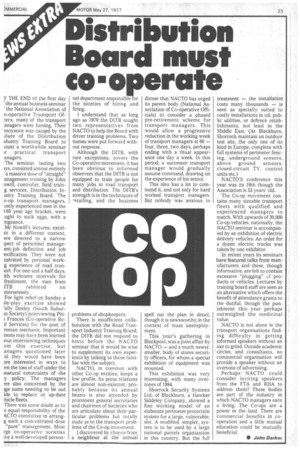Distribution Board must Como erate
Page 25

If you've noticed an error in this article please click here to report it so we can fix it.
V THE END of the first clay the annual business seminar the National Association of o-operative Transport Of:..ers, many of the transport [onagers were fuming. Their moyance was caused by the [ilure of the Distribution idustry Training Board to ount a worthwhile seminar 1r practical transport anagers.
The seminar, lasting two tys, consisted almost entirely a massive dose of "straight" anagement training by John owill, controller, field traing services, Distribution InIstry Training Board. The o-op transport managers, ostly experienced men in the )-65 year age bracket, were ught to suck eggs, with a ngeance.
Mr Nowill's lectures, excelnt in a different context, ere directed to a narrow ;pect of personnel manageent-job definition and job lecification. They were not ustrated by personal workg experience of road tranlort. For one and a half days, ith welcome intervals for freshment, the man from ITB rabbited on morselessly.
For light relief on Sunday a Ile-play exercise showed 'ally Deeley (South Suburin Society) interviewing Phi) Frances (Co-operative Reil Services) for the post of reman mechanic. Important ssons may have been learned out interviewing techniques om this exercise, but onagers questioned later id they would have been ore interested in ways to am the loss of staff under the natural constraints of the Ly policy. The managers are also concerned by the ige sums needing to be out ide to replace or up-date hide fleets.
There was some doubt as to e equal responsibility of the OiCTO committee in arrangg such a concentrated dose "pure" management. Most rge co-operative societies ive a well-developed person nel department responsible for the niceties of hiring and firing.
I understand that as long ago as 1970 the DITB sought two representatives from NACTO to help the Board with driver training problems. Two names were put forward without response.
Although the DITB, with rare exceptions, covers the Co-operative movement, it has been obvious to informed observers that the DITB is not equipped to train people for many jobs in road transport and distribution. The DITB's strength is in the techniques of -etailing, and the business problems of shopkeepers.
There is .insufficient collaboration with the Road Transport Industry Training Board; the DITB did not respond to hints before the NACTO seminar that it would be wise to supplement its own experience by talking to those familiar with the subject.
NACTO, in common with other Co-op entities, keeps a low profile. Its press relations are almost non-existent, probably because its annual beano is also attended by prominent general secretaries and chairmen of Societies who are articulate about their particular problems but totally mute as to the transport problems of the Co-op movement.
I discovered by chance from a -neighbour at the annual dinner that NACTO has urged its parent body (National Association of Co-operative Officials) to consider a phased pre-retirement scheme for transport managers. This would allow a progressive reduction in the working week of transport managers at 60 — four, three, two days, perhaps ending with a ritual appearance one day a week. In this period, a successor transport manager would, gradually assume command, drawing on the experience of his senior.
This idea has a lot to commend it, and not only for hard worked transport managers. But nobody was anxious to spell out the plan in detail, though it is newsworthy in the context of mass unemployment.
This year's gathering in Blackpool, was a joint affair by NACTO — and a much newer, smaller, body of stores security officers, for whom a special exhibition of equipment was mounted.
This exhibition was very interesting, with many overtones of 1984.
Shorrock Security Systems Ltd, of Blackburn, a Hawker Siddeley Company, showed a fine working model of an elaborate perimeter protection system for a large, vulnerable, site. A modified, simpler, system is to be used by a large national parcels organization in this country. But the full treatment -the installation costs many thousands — is seen as specially suited to costly installations in oil, public utilities, or defence establishments, not least in the Middle East. (At Blackburn, Shorrock maintain an outdoor test site, the only one of its kind in Europe, complete with full systems of perimeter fencing, underground sensors, above ground sensors, closed-circuit TV, control units etc.) NACTO'S conference this year was its 19th though the Association is 52 years' old.
The Co-op movement contains many sizeable transport fleets with qualified and experienced managers to match. With upwards of 30,000 Co-op vehicles, nationally, the NACTO seminar is accompanied by an exhibition of electric. delivery vehicles. An order for a dozen electric trucks was taken by one exhibitor.
In recent years its seminars have featured talks from manufacturers and these, though informative, are felt to contain excessive "plugging" of products or vehicles. Lectures by training board staff are seen as an alternative which offers the benefit of attendance grants to the dutiful, though the punishment this year perhaps outweighed the medicinal • value.
NACTO is not alone in the transport organisations finding difficulty in getting informed speakers without an axe to grind. Outside academic circles, and consultants, no commercial organisation will provide a speaker without an overtone of advertising.
Perhaps NACTO could consider inviting speakers from the FTA and RHA to address them? These bodies are part of the industry in which NACTO managers earn a living. The Co-ops are a power in the land. There are commercial benefits in cooperation and a little mutual education could be mutually beneficial.
• John Darker












































































































